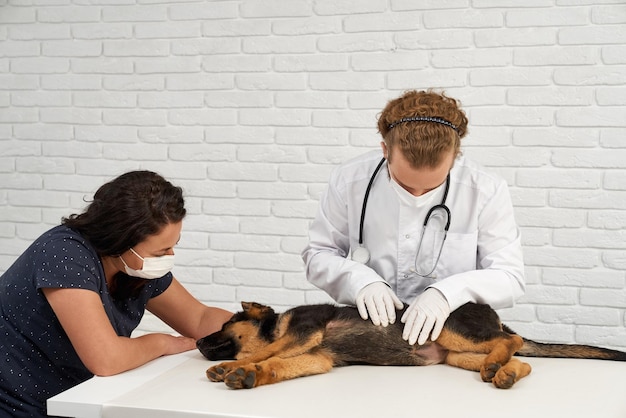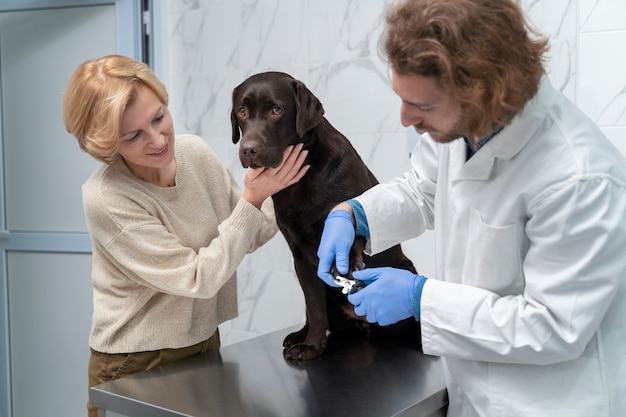How Routine Cancer Screenings Benefit Your Pet’s Health


How Routine Cancer Screenings Benefit Your Pet’s Health
As a caring pet owner, you want your dog or cat to enjoy a long, healthy life by your side. The thought of cancer can be frightening, especially as our pets age and become more vulnerable to certain health conditions. However, advances in veterinary oncology have made it possible to catch cancer earlier and treat it more effectively than ever before. At Veterinary Cancer Health, located at 4101 Turtle Creek Drive, Coral Springs, FL, our dedicated team of veterinary oncology professionals focuses exclusively on advanced cancer care for dogs and cats. One of the most powerful tools we offer is routine cancer screening for pets in Coral Springs and surrounding communities. In this blog, we will guide you through the importance of early cancer detection in dogs and cats, explain how screenings work, and provide practical advice for protecting your pet’s long-term well-being. If you have ever searched for an "oncology vet near me" or wondered where to find trusted cancer screening for pets in Coral Springs, this article is for you.
Understanding When Cancer Screening Applies to Your Pet
Recognizing when your pet might benefit from cancer screening is a critical first step. While cancer can affect dogs and cats of any age or breed, risk increases as pets get older. Key signs that may suggest the need for a cancer screening include the development of unusual lumps or bumps, unexplained weight loss, persistent lameness, changes in appetite, difficulty breathing, or wounds that do not heal. Some pets show more subtle symptoms, such as lethargy, decreased interest in play, or recurring digestive upset. If your pet is a senior or belongs to a breed predisposed to cancer, your primary veterinarian may recommend routine cancer screening as part of their ongoing health plan.
As a specialty referral destination for cancer diagnosis and treatment, our veterinary team collaborates closely with general practitioners to ensure that pets with concerning symptoms or belonging to high-risk groups receive timely cancer diagnostics in Coral Springs. Even if your pet seems healthy, routine cancer screening for pets near you can offer peace of mind and an opportunity to detect cancer before it becomes advanced. Early detection is especially important for families who want to provide the best quality of life for their pets.
What Causes Cancer in Dogs and Cats?
Cancer is a complex disease with many contributing factors. In pets, some of the most significant causes include genetic predisposition, environmental influences, exposure to certain chemicals or toxins, and the natural aging process. For example, certain dog breeds, such as Golden Retrievers or Boxers, have a higher genetic risk of developing specific cancers. In cats, older age and exposure to viruses like feline leukemia can play a role.
Living in a warm, humid climate such as South Florida can sometimes increase the risk of certain skin cancers, particularly in pets that spend a lot of time outdoors. Additionally, pets in urban and suburban areas may encounter environmental carcinogens in the form of lawn chemicals or vehicle emissions. However, cancer can develop in any pet, regardless of lifestyle or breed. This unpredictability is why proactive cancer screening for pets in Coral Springs is recommended for early intervention and improved outcomes.
Understanding these risk factors helps our veterinary oncology team recommend the most appropriate screening and diagnostic options for your pet. By tailoring our approach, we can focus on the specific risks your dog or cat faces, whether due to age, genetics, or lifestyle.
How Veterinary Cancer Screenings Work: The Path to Early Cancer Detection in Dogs and Cats
Routine cancer screening for pets involves a combination of thorough physical examinations, advanced diagnostic imaging, and laboratory testing. At Veterinary Cancer Health, we use state-of-the-art technology to provide the most accurate and comprehensive assessments available.
During a cancer screening, our veterinarians begin with a detailed medical history and a nose-to-tail physical exam, paying close attention to any changes in your pet’s body or behavior. If any abnormalities are detected, we may recommend additional tests such as digital radiographs (X-rays) to visualize internal structures, ultrasound imaging for soft tissue evaluation, or a CT scan for advanced three-dimensional views. These tools allow us to detect tumors, masses, or organ changes that might not be visible externally.
Laboratory testing is another essential aspect of cancer screening. We may suggest routine bloodwork and urinalysis to identify subtle changes in organ function or blood cell counts that could indicate underlying disease. In some cases, additional advanced testing such as biopsy and cytology or DNA sequencing and molecular analysis may be recommended for a definitive diagnosis.
The goal of these screenings is to achieve early cancer detection in dogs and cats, which dramatically increases the chances of successful treatment. By identifying cancer at an earlier stage, we can offer a wider range of therapeutic options, minimize discomfort, and help your pet maintain a better quality of life.
Management and Treatment Options Following Early Detection
If cancer is detected during a routine screening, you are not alone. Our veterinary oncology professionals will walk you through every step of the process, from staging the cancer to developing a personalized treatment plan. Treatment approaches may involve chemotherapy and medical treatments designed to target the specific type of cancer your pet has. For some pets, targeted therapy, immunotherapy, or electrochemotherapy may be appropriate, depending on the diagnosis and overall health of your dog or cat.
Our approach is always tailored to your pet’s unique needs and your family’s goals. We focus on maximizing comfort, maintaining quality of life, and providing clear information so you can make the best decisions for your beloved companion. Ongoing cancer care and monitoring are critical, as they allow us to adjust treatment protocols and address any side effects or new developments as they arise. Through close collaboration with your primary veterinarian, we ensure seamless communication and continuity of care throughout your pet’s cancer journey.
In some cases, especially when cure is not possible, we provide palliative care options to manage pain and support comfort. Our veterinary team is committed to compassionate guidance, whether your pet is undergoing active treatment or needs support during end-of-life transitions.
How Pet Owners Can Help Prevent and Monitor for Cancer
While not all cases of cancer in pets can be prevented, there are meaningful steps you can take to reduce risks and support early detection. Scheduling regular veterinary check-ups is essential, especially as your pet reaches middle age or older. During these visits, discuss your pet’s risk factors with your veterinarian and ask whether cancer screening is appropriate for your dog or cat’s age and breed.
At home, keep a close eye on any changes in your pet’s appearance or behavior. Gently feel for new lumps, monitor for persistent sores, and watch for shifts in appetite, weight, or activity levels. If you notice anything unusual, do not wait for it to resolve on its own. Bringing these concerns to your primary veterinarian or contacting an oncology vet near you can lead to earlier intervention and improved outcomes.
Minimizing exposure to environmental toxins, providing a balanced diet, and maintaining a healthy weight are additional strategies for supporting your pet’s overall wellness. However, even with excellent preventive care, some cancers develop without obvious warning signs; this is why routine cancer screenings for pets near Coral Springs are so valuable.
When to Seek Veterinary Cancer Care in Coral Springs
It can be difficult to determine when your pet’s symptoms warrant a visit to a specialist. You should contact your primary veterinarian or seek a referral to our oncology team if you notice persistent swelling, unexplained weight loss, difficulty eating or breathing, or sores that do not heal. Visible tumors, sudden behavioral changes, or chronic lameness also warrant professional attention.
If your primary veterinarian has already identified concerning findings or you are seeking advanced diagnostics, our veterinary oncology professionals at Veterinary Cancer Health are here to help. We offer specialized cancer screening for pets in Coral Springs and provide second opinions, comprehensive diagnostics, and tailored treatment plans. If you are searching for a "specialist vet near me" or "oncology veterinarian near me," our clinic is a trusted referral destination for both pet owners and general practitioners.
Remember, early cancer detection in dogs and cats is the key to better outcomes, less invasive treatments, and more time with your beloved pet. If you are unsure whether your pet needs cancer screening, do not hesitate to reach out for guidance.
Taking Action: Protecting Your Pet’s Future Health
Routine cancer screening for pets can make a life-changing difference for your dog or cat. By prioritizing early cancer detection in dogs and cats, you are giving your pet the best possible chance at a long, comfortable, and happy life. At Veterinary Cancer Health, we are dedicated to providing expert oncology care for pets throughout Coral Springs and surrounding communities.
If you are ready to schedule a cancer screening or need a second opinion for a recent diagnosis, our veterinary oncology team is here to support you every step of the way. You can learn more about our comprehensive cancer diagnosis and staging services or explore our approach to ongoing cancer care and monitoring to see how we help pets thrive during and after treatment.
Contact us today at (195) 459-28504 to schedule your pet’s screening or consultation. If you are searching for an "oncology vet near me" or need trusted cancer screening for pets in Coral Springs, our veterinary professionals are ready to help. Together, we can give your pet the healthiest future possible.
This blog is intended for informational purposes only and does not replace professional veterinary consultation. If your pet is experiencing concerning symptoms or you have questions about cancer screening, please contact our veterinary team or your primary care veterinarian for guidance.

.png)















